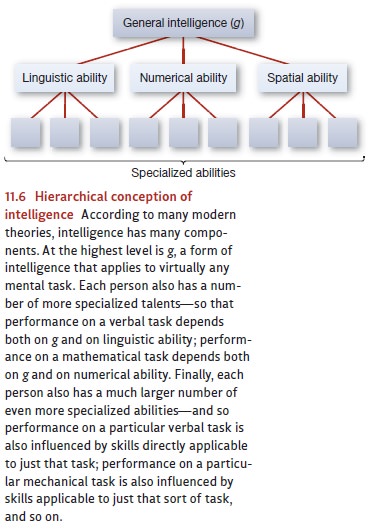Chapter: Psychology: Intelligence
A Hierarchical Model of Intelligence
A Hierarchical Model of Intelligence
Spearman
realized, however, that g is not the
sole determinant of test performance (e.g., Spearman, 1927). Instead, he
argued, each subtest depends both on g
and on some other abilities that are specific to that particular subtest. Thus,
performance on an arithmetic subtest depends on how much g a person has and also on the strength of that person’s (more
specialized) numerical skills; performance on vocabulary tests depends on the
combination of g and the person’s
verbal skill; and so on. This pattern would explain both why the scores on all
the subtests are correlated (because all the subtests rely on g, and so all reflect whether the person
has a lot of g or a little) and why
the correlations aren’t perfect (because performance on each subtest also
depends on specialized abilities).
More
recent studies have supported Spearman’s claim and have also illuminated what
the more specialized abilities might be. One specialized ability involves
verbal and linguistic skill, and so someone who has a lot of this ability will
do well on almost any task that hinges on language skills. A second specialized
ability involves quantitative or numerical ability; a third involves spatial or
mechanical ability. On this basis, we can think of intellectual performance as
having a hierarchical structure as shown in Figure 11.6. Researchers disagree
about the details of this hierarchy; but by most accounts, g is at the top of the hierarchy and contributes to virtually all
tasks. At the next level down are the abilities we just described—language,
quantitative, and spatial—and, according to some authors, several more besides
(including a specialized ability for fast-paced mental tasks, a specialized
ability to learn new mate-rials, and so on). Then at the next level are a large
number of even more specific capacities—at least 80 have been identified—each
useful for a narrow and special-ized set of tasks (J. Carroll, 1993; W.
Johnson, Nijenhuis, & Bouchard, 2007; McGrew, 2009; R . Snow, 1994, 1996).

This
hierarchical conception leads to a number of predictions that have been
confirmed by psychometric research. Specifically, if we choose tasks from two
different categories—say, a verbal task and a task requiring arithmetic—we
should expect to find a correlation in performance because, no matter how
different these tasks seem, they do have something in common: They both draw on
g. If we choose tasks from the same category, though—say, two verbal
tasks, or two quantitative tasks—we should expect to find a higher correlation because these tasks
have two things in common: They both draw on g, and they both draw on the more specialized capacity needed for
that category. The data confirm both of these predictions—moder- ately strong
correlations among all of the IQ test’s subtests, and even stronger
correlations among subtests in the same category.
So where does this leave us regarding the two hypotheses we intro-duced earlier? One hypothesis, initially offered by Binet, is that intelli-gence is a general skill, useful for all endeavors. The other proposal is that there are multiple forms of intelligence, each useful for a particular type of task. We now see that both suggestions are correct. Each person has some amount of g, and he draws on that capacity in virtually everything he does. As a result, there is consistency in someone’s performance—an overall level of achievement shaped by the person’s g. But the consis-tency isn’t perfect, because mental tasks also require more specialized abilities—and each person has each of these to some extent. This is why, in addition to the overall level of con-sistency, each person has his own profile of strengths and weaknesses, things he does relatively well and things he does less well.
Related Topics